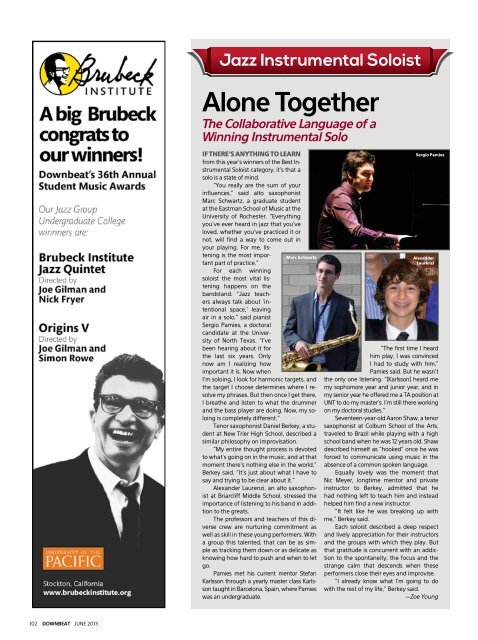You also want an ePaper? Increase the reach of your titles
YUMPU automatically turns print PDFs into web optimized ePapers that Google loves.
Jazz Instrumental SoloistAlone TogetherThe Collaborative Language of aWinning Instrumental SoloIf there’s anything to learnfrom this year's winners of the Best InstrumentalSoloist category, it’s that asolo is a state of mind.“You really are the sum of yourinfluences,” said alto saxophonistMarc Schwartz, a graduate studentat the Eastman School of Music at theUniversity of Rochester. “Everythingyou’ve ever heard in jazz that you’veloved, whether you’ve practiced it ornot, will find a way to come out inyour playing. For me, listeningis the most importantpart of practice.”Marc SchwartzFor each winningsoloist the most vital listeninghappens on thebandstand. “Jazz teachersalways talk about ‘intentionalspace,’ leavingair in a solo,” said pianistSergio Pamies, a doctoralcandidate at the Universityof North Texas. “I’vebeen hearing about it forthe last six years. Onlynow am I realizing howimportant it is. Now whenI’m soloing, I look for harmonic targets, andthe target I choose determines where I resolvemy phrases. But then once I get there,I breathe and listen to what the drummerand the bass player are doing. Now, my soloingis completely different.”Tenor saxophonist Daniel Berkey, a studentat New Trier High School, described asimilar philosophy on improvisation.“My entire thought process is devotedto what’s going on in the music, and at thatmoment there’s nothing else in the world,"Berkey said. "It’s just about what I have tosay and trying to be clear about it.”Alexander Laurenzi, an alto saxophonistat Briarcliff Middle School, stressed theimportance of listening to his band in additionto the greats.The professors and teachers of this diversecrew are nurturing commitment aswell as skill in these young performers. Witha group this talented, that can be as simpleas tracking them down or as delicate asknowing how hard to push and when to letgo.Pamies met his current mentor StefanKarlsson through a yearly master class Karlssontaught in Barcelona, Spain, where Pamieswas an undergraduate.Sergio PamiesAlexanderLaurenzi“The first time I heardhim play, I was convincedI had to study with him,”Pamies said. But he wasn’tthe only one listening. “[Karlsson] heard memy sophomore year and junior year, and inmy senior year he offered me a TA position atUNT to do my master’s. I’m still there workingon my doctoral studies.”Seventeen-year-old Aaron Shaw, a tenorsaxophonist at Colburn School of the Arts,traveled to Brazil while playing with a highschool band when he was 12 years old. Shawdescribed himself as “hooked” once he wasforced to communicate using music in theabsence of a common spoken language.Equally lovely was the moment thatNic Meyer, longtime mentor and privateinstructor to Berkey, admitted that hehad nothing left to teach him and insteadhelped him find a new instructor.“It felt like he was breaking up withme,” Berkey said.Each soloist described a deep respectand lively appreciation for their instructorsand the groups with which they play. Butthat gratitude is concurrent with an addictionto the spontaneity, the focus and thestrange calm that descends when theseperformers close their eyes and improvise.“I already know what I’m going to dowith the rest of my life,” Berkey said. —Zoe Young102 DOWNBEAT JUNE 2013
















